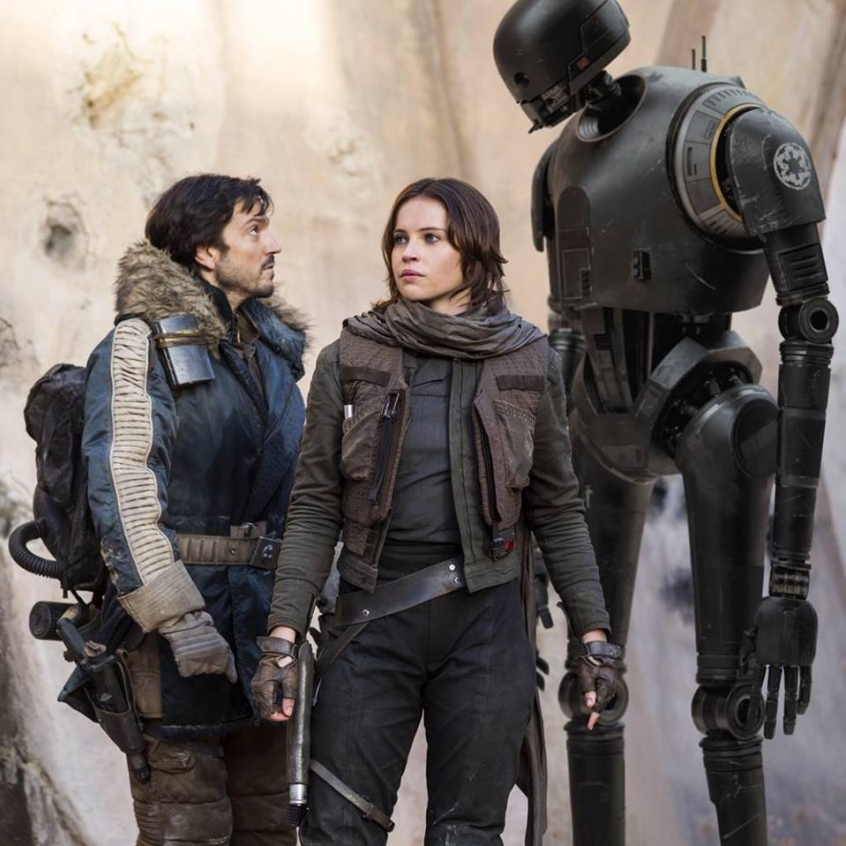
All that's required for evil to prevail is for good people to do nothing. So said William Wilberforce, and so echo the crew of the Rogue One, the eponymous spacecraft at the heart of Gareth Edwards' Star Wars prequel-sequel. The much-anticipated movie, which is more spin-on than spin-off, is largely a story about a few brave souls facing up against looming and devastating darkness, and trusting in an almost invisible hope that somehow they can still defeat it. 2016 couldn't have hoped for a more timely or fitting cinematic climax.
The first of the now Disney-owned franchise's 'anthology' movies, Rogue One attempts to fill in the gaps between Episodes III (the one where Darth Vader arrives), and IV (the one with the first Death Star). The basic plot is both teased by the trailer, and somewhat dictated by sci-fi movie legend, charting the tale of rebels who steal the plans for the infamous space station, and thus set up the successful attack at the end of the original movie.
Given that we already know how their mission turns out, British director Edwards has a job on his hands to deliver a tense and compelling slice of space opera – and the good news is that he largely succeeds. The cast of (mostly) all-new characters are interesting and three-dimensional, particularly heroic lead Jyn Erso (Felicity Jones), and the plot that she and her co-conspirators play out is alternately thrilling, thoughtful and surprising. It's smart, well-written, and delivers a pretty good balance between exploring new worlds and satisfying the fanboy craving for references and familiarity. It also looks – aside from a couple of slips – jaw-dropping; some of the space battles are sumptuously shot and brilliantly executed, and one or two of the more unusual special effects push the boundaries of what you thought was possible in cinema (I can't say any more, but you'll know exactly what I mean when you see it...).
Uncharacteristically as it turns out, the film gets off to a stuttering start. The early scenes are confusing, and there's some pretty diabolical acting as it moves through the first few gears. And when Forrest Whittaker turns up, delivering a performance of Golden-Raspberry-baiting hamminess, you may be forgiven for wondering if Edwards has fumbled the ball. Yet perhaps the most encouraging review one can give of Rogue One is that it keeps getting better as the runtime progresses; those early wobbles are superseded by an increasing number of 'wow' moments, deepening characterisation, and the hilarious interventions of Alan Tudyk as deadpan droid K-2SO, almost certainly the outright funniest character the Star Wars universe has produced. It's a film which crescendos brilliantly, right up to and including a final line that will have Star Wars fans weeping, and lovers of spiritual subtext leaping.
Indeed Rogue One is fairly heavy on theological themes, sitting as it does within a paradigm where there's a guiding 'Force' on which certain characters are able to draw. One particular character, the warrior Chirrup Îmwe (Donnie Yen), is portrayed as a man of strong faith, who ends up using the repeated mantra "I am with the force, and the force is with me" like a kind of Celtic prayer to guide him in battle. His 'faith' in the force is interrogated and found to be a positive thing; he's prepared to persevere in it when doubted by others, and even manages to perform an act of sort-of evangelism. In a genre which often seems to exclude religious faith as irrelevant, it's a fascinating subplot.
Perhaps the most powerful theme however is the main, painfully relevant idea of taking a stand against injustice; of exploring one's own personal redemption through directly taking on evil. While the Rogue One mission itself involves a near-suicidal trip into the heart of the Empire, Jyn and her band of heroes are prepared to look death in the eye because doing so makes their lives count for something greater. The Christian tradition has much to find in common with this idea of dying to self; of preparing to make the ultimate sacrifice that many might be saved.
Interestingly Rogue One is also the most morally and ethically complex Star Wars story to date. It's a war film, and so no longer a simplistic tale of goodies versus baddies. Edwards himself said in an interview: "It's the reality of war. Good guys are bad. Bad guys are good"; this complexity adds to the richness of the film, and also leaves some of the undoubted allegory of the tale open to interpretation.
We shouldn't lose sight of the fact that Rogue One gives us a female hero leading an otherwise non-white brigade of heroes, a sign of hope that Hollywood is finally moving away from an over-reliance on the white-male protagonist. In fact in the wake of the recent US election, a story about women and people of different ethnicities leading the charge to save the universe from a group of moneyed empire-builders feels eerily prophetic. But if you don't want to look too hard for subtext, the good news is that the first foray into the wider Star Wars galaxy turns out to be a bit of a triumph. In a year of pretty much relentless bad news, it's a welcome blast of light relief with some serious ideas at heart.
Martin Saunders is a Contributing Editor for Christian Today and the Deputy CEO of Youthscape. Follow him on Twitter @martinsaunders.













